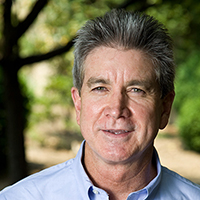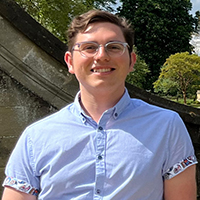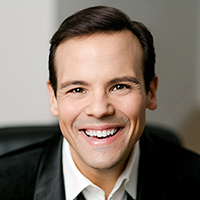Alumni Innovators at Work
April 23, 2024
UNT alumni are serving as innovators and leaders in their fields
Innovation has been part of UNT’s culture since 1890, and graduates have carried that spirit throughout the world as researchers, innovators and leaders.
Protecting Land
 James D. Nations (’72 M.S.) is an ecological anthropologist and former director of
the National Parks Conservation Association’s Center for Park Research. He has dedicated his career to helping establish and protect Indigenous territories,
national parks and biosphere reserves throughout Latin America and the U.S.
James D. Nations (’72 M.S.) is an ecological anthropologist and former director of
the National Parks Conservation Association’s Center for Park Research. He has dedicated his career to helping establish and protect Indigenous territories,
national parks and biosphere reserves throughout Latin America and the U.S.
As a Fulbright Senior Researcher, he was part of the team that established the Maya Biosphere Reserve in Guatemala. His book Lacandón Maya in the Twenty-First Century: Indigenous Knowledge and Conservation in Mexico’s Tropical Rainforest is an account of his research on Maya Indigenous groups in southeastern Mexico.
Accessible Programming
 Obianuju Okafor (’19 M.S., ’22 Ph.D.) learned about the importance of accessible programming
from UNT computer science professor Stephanie Ludi. As a doctoral researcher in Ludi’s
lab, Okafor explored ways to increase the accessibility of block-based programming
environments for people with motor and visual impairments.
Obianuju Okafor (’19 M.S., ’22 Ph.D.) learned about the importance of accessible programming
from UNT computer science professor Stephanie Ludi. As a doctoral researcher in Ludi’s
lab, Okafor explored ways to increase the accessibility of block-based programming
environments for people with motor and visual impairments.
She’s putting that research to use as a software engineer at Microsoft, working on data analytics tools and collaborating with the data visualization team to make those tools accessible to people with visual impairments. Okafor also hopes to instill a passion for building accessible software applications in future programmers through her role as a lecturer at the University of Texas at Austin.
Semiconductor Development
 As a process development engineer and program manager at Texas Instruments, John Alptekin
(’19, ’23 Ph.D.) researches packaging and integration processes related to the micro-electromechanical
systems, known as ‘MEMS’, that power TI’s trademarked Digital Light Processing (DLP®)
technology. Commonly found in personal electronics like digital projectors, DLP also
has automotive and industrial applications.
As a process development engineer and program manager at Texas Instruments, John Alptekin
(’19, ’23 Ph.D.) researches packaging and integration processes related to the micro-electromechanical
systems, known as ‘MEMS’, that power TI’s trademarked Digital Light Processing (DLP®)
technology. Commonly found in personal electronics like digital projectors, DLP also
has automotive and industrial applications.
Alptekin began researching semiconductor manufacturing as an undergraduate in chemistry professor Oliver Chyan’s lab. His doctoral research in packaging reliability and thin films made him a key driver for several high-profile technology transfers, including UNT’s patented MIR-IR wafer characterization metrology, which was licensed to Intel in the largest technology transfer award in UNT history.
Understanding Cancer's Toll
 Dr. Stephanie Serres (’06 M.S., ’09 Ph.D.), a surgeon at UT Southwestern Medical Center
in Dallas, says her studies in clinical psychology at UNT, coupled with her medical training, have made her specialization in breast cancer a good fit professionally.
Dr. Stephanie Serres (’06 M.S., ’09 Ph.D.), a surgeon at UT Southwestern Medical Center
in Dallas, says her studies in clinical psychology at UNT, coupled with her medical training, have made her specialization in breast cancer a good fit professionally.
Outside the operating room, Serres has considered a range of topics in her research, including axillary management in breast cancer patients, medicolegal issues among breast cancer surgeons, variation in care among surgical patients during COVID-19 and patient-reported outcomes. Her current research focuses on the psychological toll a breast cancer diagnosis can have, which she hopes can inform better patient interactions to minimize their anxiety and trauma around the diagnosis.
Music Honors
 David Portillo (’05 M.M.) is a tenor who was nominated for a Grammy award in 2024
for his role as a principal soloist in the Boston Modern Orchestra Project’s production
of John Paul Corigliano’s The Lord of Cries. He also earned the Medal of Excellence from the nonprofit Sphinx Organization, which
recognizes Black and Latinx classical artists who demonstrate artistic excellence,
an outstanding work ethic and a commitment to leadership and their communities.
David Portillo (’05 M.M.) is a tenor who was nominated for a Grammy award in 2024
for his role as a principal soloist in the Boston Modern Orchestra Project’s production
of John Paul Corigliano’s The Lord of Cries. He also earned the Medal of Excellence from the nonprofit Sphinx Organization, which
recognizes Black and Latinx classical artists who demonstrate artistic excellence,
an outstanding work ethic and a commitment to leadership and their communities.
He has performed at opera houses around the world, including The Metropolitan Opera, Deutsche Oper Berlin, the Glyndebourne Festival, Opera Australia at the Sydney Opera House and the Wiener Staatsoper, as well as the Washington National, Houston Grand and Dallas operas.
Jessica DeLeón, Amanda Fuller and Heather Noel contributed to this story.